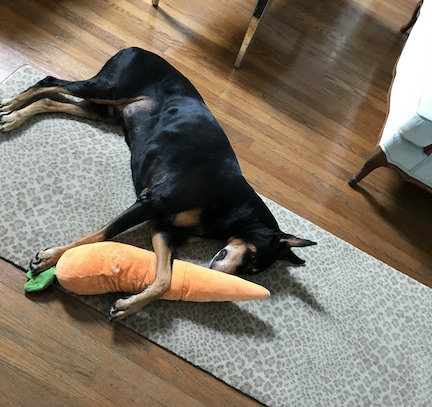Anti-Aging Supplements for Dogs
- hadleyhenriette
- Apr 2, 2024
- 4 min read
Updated: May 26, 2024

This is the story of how I biohacked my dog—and you can too.
One day, I came home, and there was no sign of him. In recent years, there was a growing lag between my arrival and my Doberman's dash to the front door to greet me. Then he stopped coming at all. Every dog owner knows this is a bad sign.
My Doberman, Magic Mike, or "Mikey," is a senior at 11 and a half. Mikey is already past the expected Doberman life span of 9-11 years. He is exactly the age our first Doberman was when we had to put him to sleep, so when he stopped coming to the door and having trouble getting up, I figured this was the beginning of the end.
After I had time to process what might be happening, I took a moment to consider if I was really doing everything I could for him. His (mostly) home-cooked meals were organic and included doses of fish and flax seed oils, but I realized that from the framework of a biohacker, I wasn't quite pulling out all the stops. I decided it was time get serious and apply all of the knowledge I had acquired on human longevity on him.
The first thing did was take a deep dive listening to Dave Asprey's "Biohacking for Pets" episode on the Human Upgrade. On it, he interviews Dr. Gary Richter, DVM, a excellent vet. I bought and read his books, The Ultimate Pet Health Guide and Longevity for Dogs. These were helpful, but at the end of the day, I realized that had to figure out what was really bothering him most and work on that.
The vet said blood tests were good, although we did not do functional testing on him as I am working with a conventional vet. So, I started with the most likely culprit of his reluctance to move: arthritis. Our first Doberman had bad arthritis, so we had given him intramuscular Cosequin injections. These were described by the vet as a supercharged "glucosamine for dogs." But it may have been hard on his liver (I have learned that one must also be cautious with glucosamine doses) While he got the bounce back in his step after starting cosequin, ultimately, his liver failed within 18 months after starting.
So, I decided to be more holistic with Mikey and focus on nutritional supplements and share my NMN with him, which boosts NAD+ and is safe for dogs.
The following is my protocol:
The Main Meal:
In the A.M., I give him 150mg of NMN powder on a plate (with a smudge of food) for him to lick. He does this before I give him his breakfast.
The base is usually ground turkey with Publix Capri Blend, with organic sprouted oatmeal, grass-fed bovine collagen powder, and a pinch of Celtic sea salt cooked over low heat. I sometimes mix in a can of organic, carrageenan-free dog food or a can of sardines in water for protein variety.
In the A.M. I add the following to his bowl and mix:
50mg Co-Q-10 soft gel
1 capsule glucosamine
Proviable-DC (doggie probiotic)
Dollop of Sheep Milk yogurt (from Whole Foods)
1 Capsule Carlson's Fish Oil
1 Capsule Krill oil or 1 tsp MCT oil
1 raw egg
1 tsp. Dr. Bob Goldstein's Daily Herbal Internal Powder
Fresh fruit with every breakfast (banana, blueberries, strawberry tops)
In the afternoon he gets Wuffles Advanced Hip & Joint Support Chews at least once a day. They have: Glucosamine, MSM, Green Lipped Mussels, Chrondotin Sulfate, Vitamin C, Hyaluronic Acid, Omega 2 from Wild Alaskan Salmon, and Yucca Schidigera.
In the P.M., I add:
1 Carlson Fish Oil
A few drops of Concentrace trace minerals
Milk Thistle (cycle on and then off for a few weeks)
Less than two weeks after starting this protocol when he was noticeably perkier and more playful. Suddenly, he was up and at 'em, pulling on the leash again. It's hard to say which of these things made the biggest difference. Most likely, it was the combination. I certainly can't say how long this respite will last, but for me, my husband, and even fellow dog friends, it was quite a stark difference encouraged me to go further.
While some supplements that are beneficial for humans are definitely not for dogs, many of the same ones you take would be good for your dog.
Here is a list from Longevity for Dogs:
Ashwaganda (lengthens telomeres)
Berberine
Carotenoids
CoQ10
Curcumin
EGCG
EFAs
Fisetin
Magnesium
Melatonin
Mushrooms
NAC
NMN
Oleuropein Aglycone
Probiotics
Quercetin
Selenium
Serine
Spermidine
Sulforaphane
Vitamin D & K
Vitamin B
Vitamin C
Zinc
Please reference correct dosages for your dog's size and weight before using them. There is a handy dosage chart here.
Watch your dog's behavior carefully after starting a new supplement. Start one new compound at a time. Watch for dangerous or non-dog safe ingredients in supplements. To be safe, use either single compound vitamins or those formulated especially for dogs.
How I biohacked my dog with anti-aging supplements.
Disclaimer: As with any dietary supplement, it is advisable to consult with a healthcare or veternary professional before incorporating supplements into your or your dog's wellness routine, particularly if you have any underlying health conditions or are taking medications. information provided here is not intended to replace professional medical advice or diagnosis. It is purely for informational purposes and should not be considered as a substitute for consulting with a healthcare professional.











Comments